News
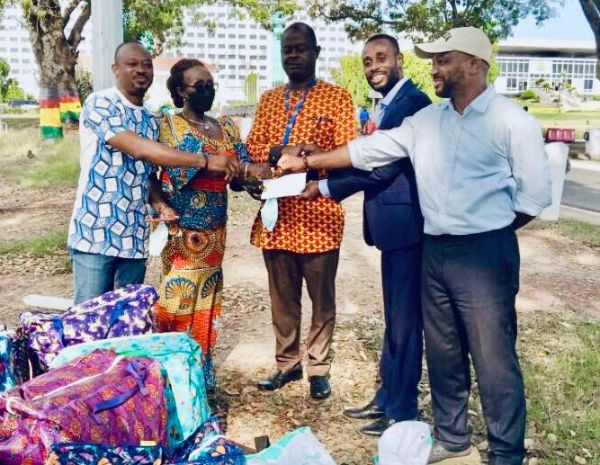
Centre for Social Justice Supports Keta Tidal Wave Victims
The Centre for Social Justice (CSJ) has donated food stuffs, books, clothes and cash totaling totaling GHc10,000 to victims of the Keta tidal wave disaster which occured on November 7.
A CSJ delegation led by Comrades Philip Zumanu, Nii Armah Addy and Robert Dela Mawuenyegah made the presentation on December 2, 2021 to the Members of Parliament for Ketu South and Anlo Constituencies who received the donation on behalf of the people at a short ceremony at the Parliament House in Accra.
The move, according to the Centre, was a token gesture to help alleviate the plight of residents who lost livelihoods and properties to tidal waves in Keta and its surrounding areas last month.
The donation was made through generous voluntary contributions from members, experts and Fellows of the Centre for Social Justice.
“We appreciate this kind gesture from CSJ. We would also like to use the CSJ platform to appeal to other benevolent Ghanaians to support the completion of a facility to serve as a place of shelter for the displaced residents”, said the MP for Ketu South, Hon. Abla Dzifa Gomashie, as she received the donation.
On his part, Hon. Richard Kwame Sefe, MP for the Anlo Constituency appealed to the good people of Ghana to support him to build a school for the people of Fuveme in the Anlo Constituency in the Volta Region.
About 3,000 people in the Keta Municipality were rendered homeless after tidal waves swept through their homes on Sunday, November 7. Communities such as Abutiakope, Kedzikope and Keta Central were largely affected as affected homeless residents were left with nothing to salvage.
Affected residents, mainly children and women, had their residential abodes completely destroyed by the tidal waves.
Credit: www.newswatchgh.com
A CSJ delegation led by Comrades Philip Zumanu, Nii Armah Addy and Robert Dela Mawuenyegah made the presentation on December 2, 2021 to the Members of Parliament for Ketu South and Anlo Constituencies who received the donation on behalf of the people at a short ceremony at the Parliament House in Accra.
The move, according to the Centre, was a token gesture to help alleviate the plight of residents who lost livelihoods and properties to tidal waves in Keta and its surrounding areas last month.
The donation was made through generous voluntary contributions from members, experts and Fellows of the Centre for Social Justice.
“We appreciate this kind gesture from CSJ. We would also like to use the CSJ platform to appeal to other benevolent Ghanaians to support the completion of a facility to serve as a place of shelter for the displaced residents”, said the MP for Ketu South, Hon. Abla Dzifa Gomashie, as she received the donation.
On his part, Hon. Richard Kwame Sefe, MP for the Anlo Constituency appealed to the good people of Ghana to support him to build a school for the people of Fuveme in the Anlo Constituency in the Volta Region.
About 3,000 people in the Keta Municipality were rendered homeless after tidal waves swept through their homes on Sunday, November 7. Communities such as Abutiakope, Kedzikope and Keta Central were largely affected as affected homeless residents were left with nothing to salvage.
Affected residents, mainly children and women, had their residential abodes completely destroyed by the tidal waves.
Credit: www.newswatchgh.com
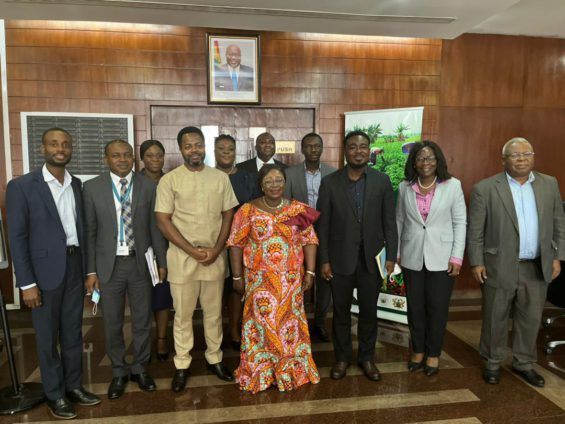
Government to implement intersectoral action plan to stem judgment debt payments – Chief of Staff
The Chief of Staff, Frema Opare, has tasked the Deputy Attorney General, Diana Asonaba-Dapaah, officials from the Finance Ministry and other government officials to draw up an action plan to systematically implement key recommendations emerging from a 20-year review of judgment debt payments in Ghana conducted by the Centre for Social Justice.
She made the comments when she received a delegation from the Centre for Social Justice (CSJ) at her office at the Jubilee House in Accra.
The CSJ presented the Chief of Staff with a copy of a judgment debt report prepared by the Finance and Economy Pillar of the Centre.
The report which is entitled “A 20-year review of judgment debt payments in Ghana: impact, causes and remedies” catalogs the incidence of Judgment debts in Ghana from 2000 to 2019.
Present at the meeting were representatives of the CSJ, the Chief of Staff and her deputy in charge of operations, Chief Director at the Office of the Chief of Staff, Deputy AG & Minister for Justice and the Directors of Budget and Legal Departments of the Ministry of Finance.
Presenting the report, the Council Chairman of the CSJ, Dr. Sodzi Sodzi-Tettey said that the report details the causes of judgment debts over the period, the various categories of the judgment debts, as well as offering recommendations for the avoidance of such incidents in future.
He noted that funds lost to the state due to the payment of such debts are resources that could otherwise have been utilized for national development.
Dr. Sodzi-Tettey recommended a bipartisan process leading to a government judgment debt framework with specifications for how governments enter into, continue or abrogate contracts entered into by predecessor governments, with judgment debts associated with political transitions accounting for over 70% of the reviewed judgment debts.
The CSJ also recommended an inter-ministerial committee of the Finance Ministry and the Attorney General’s Departments to take stock of all judgment debts and work collaboratively to either fight them robustly in Court or arrange feasible payment terms as needed.
Dr. Sodzi-Tettey recommended clear policy guidelines for public officials surcharged in the Auditor General’s report for their roles in causing judgment debts to reimburse the Consolidated Funds and for updates on the state of such reimbursements to be included in each year’s Auditor General’s report as an accountability measure.
The Deputy AG & Minister for Justice in charge of Civil Cases, Diana Asonaba-Dapaah informed the meeting that her office had put in place several measures since 2016 to reduce the award of Judgment debts, including the assignment of five senior lawyers to key ministries to help in the thorough review of contracts before signing.
Madam Asonaba-Dapaah also mentioned government’s strategy to depart from the practice of using inexperienced lawyers rather than senior lawyers to contest judgment debt cases.
She lauded the decision of the President to create two deputies for the Attorney General, in charge of Civil and Criminal cases, as a clear sign of the government’s seriousness in tackling the menace of judgment debts with the Deputy in charge of Civil cases exercising strict oversight over judgment debt cases.
Finance Ministry officials also bemoaned the fact that in most instances, they are the last to hear of these cases after Courts have ruled and government accounts are being garnisheed. As a result, they have become even more proactive in making strong legal representations as soon as they hear of these judgment debt cases in court.
The Chief of Staff described CSOs as important actors in any democracy that play a critical role in ensuring government accountability and also contribute to policy formulation and implementation.
She however charged CSOs to also applaud government when it is on the right track, as a way of encouraging it. She requested the CSJ to track government progress on actions to curb the judgment debt issue.
Source: www.myjoyonline.com
She made the comments when she received a delegation from the Centre for Social Justice (CSJ) at her office at the Jubilee House in Accra.
The CSJ presented the Chief of Staff with a copy of a judgment debt report prepared by the Finance and Economy Pillar of the Centre.
The report which is entitled “A 20-year review of judgment debt payments in Ghana: impact, causes and remedies” catalogs the incidence of Judgment debts in Ghana from 2000 to 2019.
Present at the meeting were representatives of the CSJ, the Chief of Staff and her deputy in charge of operations, Chief Director at the Office of the Chief of Staff, Deputy AG & Minister for Justice and the Directors of Budget and Legal Departments of the Ministry of Finance.
Presenting the report, the Council Chairman of the CSJ, Dr. Sodzi Sodzi-Tettey said that the report details the causes of judgment debts over the period, the various categories of the judgment debts, as well as offering recommendations for the avoidance of such incidents in future.
He noted that funds lost to the state due to the payment of such debts are resources that could otherwise have been utilized for national development.
Dr. Sodzi-Tettey recommended a bipartisan process leading to a government judgment debt framework with specifications for how governments enter into, continue or abrogate contracts entered into by predecessor governments, with judgment debts associated with political transitions accounting for over 70% of the reviewed judgment debts.
The CSJ also recommended an inter-ministerial committee of the Finance Ministry and the Attorney General’s Departments to take stock of all judgment debts and work collaboratively to either fight them robustly in Court or arrange feasible payment terms as needed.
Dr. Sodzi-Tettey recommended clear policy guidelines for public officials surcharged in the Auditor General’s report for their roles in causing judgment debts to reimburse the Consolidated Funds and for updates on the state of such reimbursements to be included in each year’s Auditor General’s report as an accountability measure.
The Deputy AG & Minister for Justice in charge of Civil Cases, Diana Asonaba-Dapaah informed the meeting that her office had put in place several measures since 2016 to reduce the award of Judgment debts, including the assignment of five senior lawyers to key ministries to help in the thorough review of contracts before signing.
Madam Asonaba-Dapaah also mentioned government’s strategy to depart from the practice of using inexperienced lawyers rather than senior lawyers to contest judgment debt cases.
She lauded the decision of the President to create two deputies for the Attorney General, in charge of Civil and Criminal cases, as a clear sign of the government’s seriousness in tackling the menace of judgment debts with the Deputy in charge of Civil cases exercising strict oversight over judgment debt cases.
Finance Ministry officials also bemoaned the fact that in most instances, they are the last to hear of these cases after Courts have ruled and government accounts are being garnisheed. As a result, they have become even more proactive in making strong legal representations as soon as they hear of these judgment debt cases in court.
The Chief of Staff described CSOs as important actors in any democracy that play a critical role in ensuring government accountability and also contribute to policy formulation and implementation.
She however charged CSOs to also applaud government when it is on the right track, as a way of encouraging it. She requested the CSJ to track government progress on actions to curb the judgment debt issue.
Source: www.myjoyonline.com
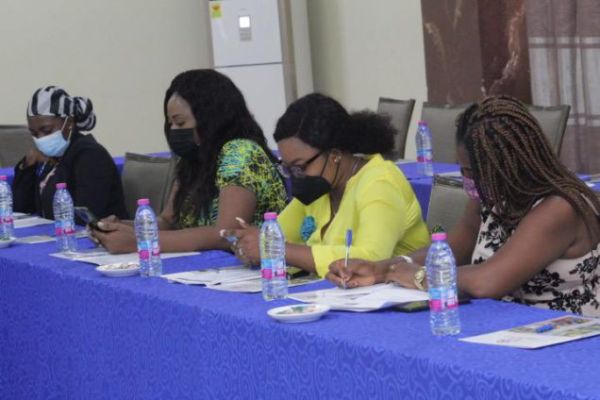
Friedrich Erbert Stiftung and the Centre for Social Justice build capacity of gender activists
A two-day capacity-building workshop on feminism and gender has been organized by Friedrich Erbert Stiftung and the Centre for Social Justice.
The workshop was attended by mid-level professionals, gender activists, academics and media practitioners from across the country.
Modules undertaken by participants included gender concepts, gender and power, legislations and policies protecting women in Ghana, sexual and gender-based violence and feminist concepts.
The lead facilitator of the workshop Bashiratu Kamal noted the key role of the media in highlighting and educating the public on gender issues.
She observed that no media house in the country has a gender policy, which inhibits their ability to play a critical role in the mainstreaming of gender issues.
Programmes Coordinator at Friedrich Erbert Stiftung, Michael Abbey, in his opening remarks briefed participants about the work of his organization in Ghana.
He expressed the hope that after the workshop, participants would champion the mainstreaming of gender issues in their various organizations.
Council Chair of the Centre for Social Justice Dr. Sodzi Sodzi-Tettey, reflected on the importance of such initiatives in bringing gender issues to the top of the national agenda.
He looked forward to further collaborations with Friedrich Erbert Stiftung.
At the end of the workshop, participants identified various actions for implementation in their respective organizations. FES and the CSJ, plan to monitor the group for the purposes of assessing the implementation status of the action items.
Credit: www.myjoyonline.com
The workshop was attended by mid-level professionals, gender activists, academics and media practitioners from across the country.
Modules undertaken by participants included gender concepts, gender and power, legislations and policies protecting women in Ghana, sexual and gender-based violence and feminist concepts.
The lead facilitator of the workshop Bashiratu Kamal noted the key role of the media in highlighting and educating the public on gender issues.
She observed that no media house in the country has a gender policy, which inhibits their ability to play a critical role in the mainstreaming of gender issues.
Programmes Coordinator at Friedrich Erbert Stiftung, Michael Abbey, in his opening remarks briefed participants about the work of his organization in Ghana.
He expressed the hope that after the workshop, participants would champion the mainstreaming of gender issues in their various organizations.
Council Chair of the Centre for Social Justice Dr. Sodzi Sodzi-Tettey, reflected on the importance of such initiatives in bringing gender issues to the top of the national agenda.
He looked forward to further collaborations with Friedrich Erbert Stiftung.
At the end of the workshop, participants identified various actions for implementation in their respective organizations. FES and the CSJ, plan to monitor the group for the purposes of assessing the implementation status of the action items.
Credit: www.myjoyonline.com
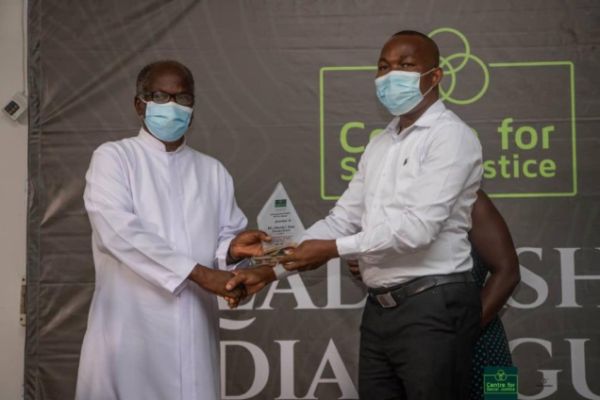
Centre for Social Justice and IMANI honour former Auditor General, Domelevo
Two Ghana-based think tanks, the Centre for Social Justice and IMANI Centre for Policy and Education have honoured the immediate past Auditor General, Daniel Yaw Domelevo with a Distinguished Public Sector Award.
The award was presented during the 8th in a series of Leadership Dialogue platforms organised by the think tanks, under the theme, ‘Uprooting Public Sector and Political Corruption in Ghana’.
The citation in part read; “Daniel Yaw Domelevo, your unwavering dedication and hard work to public service and commitment to the anti-corruption campaign put you head and shoulder above the rest.
“Your peerless role as the Auditor-in-chief for government drew bipartisan praise across the political aisle. Your unfettered resolve to ensure value for money is second to none. Today, you are celebrated for the set of innovative reforms that restored public audit to its twin mandate of independence and relevance.
“You will be fondly remembered as an unapologetic outlier, a trailblazer of our time. During your term, public bureaucracy and accountability were brought to every Ghanaian doorstep”.
The award was presented by Dr Amanda Coffie, Council member of the CSJ and King Carl Duho Tornam of IMANI Ghana.
The award was received by the brother of the recipient Reverend Stephen Domelevo. In his acceptance speech Reverend Domelevo expressed the sincere gratitude of the former Auditor General who is currently working outside Ghana.
He encouraged anti-corruption crusaders to be courageous in the discharge of their duties regardless of the many obstacles they are bound to face.
The key speakers at the function were Justice Yaw Appau, a Justice of the Supreme Court; Mary Awelana Addah, Programmes Manager at the Ghana Integrity Initiative and Manasseh Azure Awuni, Investigative Journalist and Editor in Chief of the Fourth Estate, Media Foundation for West Africa.
The award was presented during the 8th in a series of Leadership Dialogue platforms organised by the think tanks, under the theme, ‘Uprooting Public Sector and Political Corruption in Ghana’.
The citation in part read; “Daniel Yaw Domelevo, your unwavering dedication and hard work to public service and commitment to the anti-corruption campaign put you head and shoulder above the rest.
“Your peerless role as the Auditor-in-chief for government drew bipartisan praise across the political aisle. Your unfettered resolve to ensure value for money is second to none. Today, you are celebrated for the set of innovative reforms that restored public audit to its twin mandate of independence and relevance.
“You will be fondly remembered as an unapologetic outlier, a trailblazer of our time. During your term, public bureaucracy and accountability were brought to every Ghanaian doorstep”.
The award was presented by Dr Amanda Coffie, Council member of the CSJ and King Carl Duho Tornam of IMANI Ghana.
The award was received by the brother of the recipient Reverend Stephen Domelevo. In his acceptance speech Reverend Domelevo expressed the sincere gratitude of the former Auditor General who is currently working outside Ghana.
He encouraged anti-corruption crusaders to be courageous in the discharge of their duties regardless of the many obstacles they are bound to face.
The key speakers at the function were Justice Yaw Appau, a Justice of the Supreme Court; Mary Awelana Addah, Programmes Manager at the Ghana Integrity Initiative and Manasseh Azure Awuni, Investigative Journalist and Editor in Chief of the Fourth Estate, Media Foundation for West Africa.
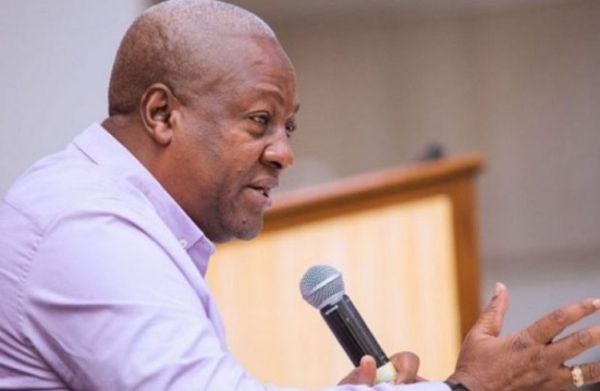
Centre for Social Justice creates platform for professional bodies to host presidential candidates
Founder of think tank, Centre for Social Justice (CSJ), Dr Sodzi Sodzi-Tetteh has said leading candidates in the various political parties will on Monday, 26th October come before a professional panel to defend their policies.
The exercise he explained is an opportunity for the candidates to present their alternatives and policies to help electorates make informed decisions on December 7.
The panel comprises of the founder for Alliance for Women in the Media, Shemima Muslim; Research Fellow at the Legon Center for International Affairs (LECIA), Dr. Amanda Quofie and Dr Lord Mawuko from GIMPA.
In attendance will be the flagbearer of the National Democratic Congress (NDC) who will present his manifesto policies and answer questions from the panel.
Speaking with Gifty Andoh Appiah on The Pulse Friday, he said as a Centre for Social Justice their aim is to create a platform for all people and groups in society to take part in the discussion.
To support this statement, he said traders from the Makola market and spare parts dealers from Abossey-Okai were to be expected at the meeting.
Dr Sodzi Sodzi-Tetteh believes these everyday persons have a more in-depth understanding of issues like economics better than most people.
“So not only will you hear from doctors, pharmacists and lawyers but you will also hear from traders, fishermen, farmers and spare parts dealers,” he said.
He noted that over 30 professional groups will be present to help in the discussion.
Dr Sodzi Sodzi-Tetteh said such a myriad of persons will ask questions to cover all aspects of society to help the electorates to make informed decisions during the general elections.
“We have the Trade Union Congress, we have the Ghana Medical Association, Ghana National Association of Teachers, Ghana Bar Association etc,” he said.
Credit: www.myjoyonline.com
The exercise he explained is an opportunity for the candidates to present their alternatives and policies to help electorates make informed decisions on December 7.
The panel comprises of the founder for Alliance for Women in the Media, Shemima Muslim; Research Fellow at the Legon Center for International Affairs (LECIA), Dr. Amanda Quofie and Dr Lord Mawuko from GIMPA.
In attendance will be the flagbearer of the National Democratic Congress (NDC) who will present his manifesto policies and answer questions from the panel.
Speaking with Gifty Andoh Appiah on The Pulse Friday, he said as a Centre for Social Justice their aim is to create a platform for all people and groups in society to take part in the discussion.
To support this statement, he said traders from the Makola market and spare parts dealers from Abossey-Okai were to be expected at the meeting.
Dr Sodzi Sodzi-Tetteh believes these everyday persons have a more in-depth understanding of issues like economics better than most people.
“So not only will you hear from doctors, pharmacists and lawyers but you will also hear from traders, fishermen, farmers and spare parts dealers,” he said.
He noted that over 30 professional groups will be present to help in the discussion.
Dr Sodzi Sodzi-Tetteh said such a myriad of persons will ask questions to cover all aspects of society to help the electorates to make informed decisions during the general elections.
“We have the Trade Union Congress, we have the Ghana Medical Association, Ghana National Association of Teachers, Ghana Bar Association etc,” he said.
Credit: www.myjoyonline.com
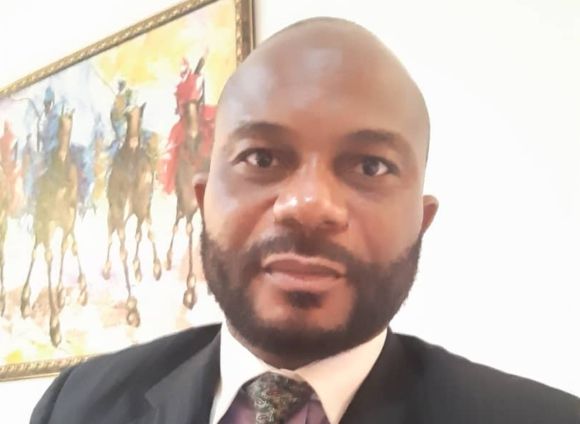
Renowned educationist, Nii Armah Addy appointed Centre for Social Justice Fellow
One of Ghana’s revered educationists, Nii Armah Addy has been appointed a fellow of the Centre for Social Justice. (CSJ)
Mr. Armah Addy will lead the centre’s Education and Social Transformation agenda
According to an announcement by Dr. Sodzi Sodzi-Tettey, Founder of the CSJ on Monday, February 8, the Fellows of the Centre will oversee pillars that form part of its mandates and lead a team of experts to undertake research, lead policy dialogue and carry out advocacy that would ensure greater participation of the citizenry.
Mr. Armah Addy comes on board as an Educationist and a Strategist with rich analytical skills and flair for communication. He is also a Chartered Management Consultant (CMC), Chartered Professional Administrator. (ChPA)
He founded the Institute of Leadership and Management in Education (InLaME), and the Institute of Professional Event Management, (IPEM) both consultancy firms.
Other fellows are Dr. William Nii Ayitey, Mrs. Bashiratu Kamal Muslim Menson and Dr. Theresa Mannah-Blankson. They will lead Health and Equity, Gender and Social Inclusion and Finance and Economy respectively.
The CJA also instituted a Council chaired by Dr. Sodzi Sodzi-Tettey, Founder of the centre.
Other members are Dr Amanda Cofie (Academic), Bashiratu Kamal-Muslim (Gender expert), Theodore Albright (Legal practitioner), Philip Delali Zumanu (Business consultant), Stephen Kemetse (Fintech executive) and George Ferguson Laing (Communications expert).
The CSJ is a Think Tank and a platform for Academics, Activists and Ghanaian patriots aiming for greater social inclusion in the distribution of the wealth, privileges and opportunities for the society.
www.ghananewspress.com
Mr. Armah Addy will lead the centre’s Education and Social Transformation agenda
According to an announcement by Dr. Sodzi Sodzi-Tettey, Founder of the CSJ on Monday, February 8, the Fellows of the Centre will oversee pillars that form part of its mandates and lead a team of experts to undertake research, lead policy dialogue and carry out advocacy that would ensure greater participation of the citizenry.
Mr. Armah Addy comes on board as an Educationist and a Strategist with rich analytical skills and flair for communication. He is also a Chartered Management Consultant (CMC), Chartered Professional Administrator. (ChPA)
He founded the Institute of Leadership and Management in Education (InLaME), and the Institute of Professional Event Management, (IPEM) both consultancy firms.
Other fellows are Dr. William Nii Ayitey, Mrs. Bashiratu Kamal Muslim Menson and Dr. Theresa Mannah-Blankson. They will lead Health and Equity, Gender and Social Inclusion and Finance and Economy respectively.
The CJA also instituted a Council chaired by Dr. Sodzi Sodzi-Tettey, Founder of the centre.
Other members are Dr Amanda Cofie (Academic), Bashiratu Kamal-Muslim (Gender expert), Theodore Albright (Legal practitioner), Philip Delali Zumanu (Business consultant), Stephen Kemetse (Fintech executive) and George Ferguson Laing (Communications expert).
The CSJ is a Think Tank and a platform for Academics, Activists and Ghanaian patriots aiming for greater social inclusion in the distribution of the wealth, privileges and opportunities for the society.
www.ghananewspress.com

Vaccine deployment plan kicks off in March with health workers, others
Ghana’s vaccine deployment plan is expected to kick off in mid-March, two weeks earlier than initially planned.
According to the Programme Manager of the Expanded Programme on Immunisation, Dr. Kwame Amponsah-Achiano, with the availability of vaccine candidates globally, Ghana has drafted its national vaccine deployment plan to aid roll out as part of COVID-19 preventive measures.
“The plan is a product of several engagements, commitments, meetings and review of available documents with several development partners” he said.
Dr. Amponsah-Achiano was speaking at a webinar organized by the Centre for Social Justice on Thursday under the topic, COVID-19 Vaccines in Ghana, Availability, the Science and the Myths.
Vaccine deployment would be based on segmentation of the population, with the eventual vaccination of the entire target population of twenty million.
The vaccination will be staggered in three phases between March and August 2021. Phase 1 is expected to cater for health care workers, security personnel and persons with known underlying medical conditions.
About 1,555,475 people are expected to be vaccinated during this phase. Phase 2 will include adults above 60 years, secondary and tertiary students, teachers, essential service providers, specialized groups on national assignment, the executive, legislature, judiciary, ministries, civil service and media personnel, covering approximately 6,380,620 people. Phase 3 will cover other members of the population excluding children under 16 years and pregnant women. About 9,523,313 persons will be vaccinated.
It is expected that the deployment will pose huge cold chain logistical challenges, with 15 districts and 7 regional health directorates needing new facilities including walk-in cold rooms.
Credit: www.ghananewspress.com
According to the Programme Manager of the Expanded Programme on Immunisation, Dr. Kwame Amponsah-Achiano, with the availability of vaccine candidates globally, Ghana has drafted its national vaccine deployment plan to aid roll out as part of COVID-19 preventive measures.
“The plan is a product of several engagements, commitments, meetings and review of available documents with several development partners” he said.
Dr. Amponsah-Achiano was speaking at a webinar organized by the Centre for Social Justice on Thursday under the topic, COVID-19 Vaccines in Ghana, Availability, the Science and the Myths.
Vaccine deployment would be based on segmentation of the population, with the eventual vaccination of the entire target population of twenty million.
The vaccination will be staggered in three phases between March and August 2021. Phase 1 is expected to cater for health care workers, security personnel and persons with known underlying medical conditions.
About 1,555,475 people are expected to be vaccinated during this phase. Phase 2 will include adults above 60 years, secondary and tertiary students, teachers, essential service providers, specialized groups on national assignment, the executive, legislature, judiciary, ministries, civil service and media personnel, covering approximately 6,380,620 people. Phase 3 will cover other members of the population excluding children under 16 years and pregnant women. About 9,523,313 persons will be vaccinated.
It is expected that the deployment will pose huge cold chain logistical challenges, with 15 districts and 7 regional health directorates needing new facilities including walk-in cold rooms.
Credit: www.ghananewspress.com
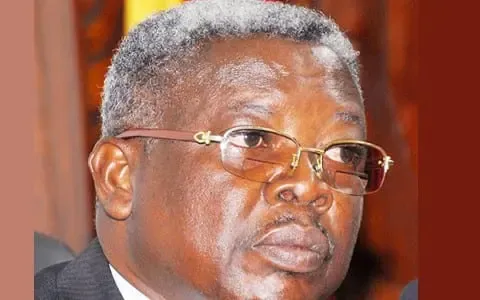
Lack of political will hindering corruption fight – Justice Appau
A Supreme Court Justice, Yaw Appau, says the fight against corruption by successive governments has failed due to the lack of political will to fight the canker.
The ruling government has come under heavy criticism for failing to deal with corruption, particularly following the resignation of Martin Amidu as Special Prosecutor and the forced retirement of Auditor General, Daniel Yaw Domelevo.
Speaking at a Leadership Dialogue series by the Centre for Social Justice, Justice Appau said successive governments have failed at eradicating the canker because of the lack of interest in leaders to prosecute offenders.
“We have gone through numerous workshops and seminars on what public sector and political corruption is. Why are we not, therefore, addressing it, or why can’t we address it? The answer is simple; poverty of leadership and the lack of political will”, he said.
Despite the backlash, the President, Nana Akufo-Addo, has said he is satisfied with the effectiveness of his government’s anti-corruption fight, adding that there is evidence to this performance.
For him, Ghana’s improved ranking on global corruption indexes is a testament to how well the government has performed.
Speaking in an interview with CNN, President Akufo-Addo said since his government came to power, Ghana’s anti-corruption ranking has “gone up several notches.”
“Am I satisfied that we’ve been effective? I will say yes. A lot has been done, and it is reflected in Ghana’s growing position and rankings of corruption in the world. We’ve gone up several notches since I came into office because we are dealing with these matters at the basic level,” he said.
Nana Akufo-Addo said anti-corruption institutions in the country were poorly resourced at the time he took over office in 2017, however, he has ensured that they are adequately resourced to work.
He said his action goes beyond making “wonderful statements” to actually making efforts to ensure that the tools needed by anti-corruption agencies are provided to ensure that they work efficiently.
“For the anti-corruption institutions of our country, when I came into office, [they] were very poorly resourced. We can talk all we like about corruption and make all the wonderful statements but if the instruments at your disposal for dealing with it are weak and blunt, you will get no result,” he said.
Asked about the exit of Daniel Domelevo from office as the Auditor-General, the president said he did not force Mr. Domelevo to leave office.
He said Domelevo’s exit was purely on the grounds that he had attained the retirement age and was due to retire.
Akufo-Addo further said he believes Mr. Domelevo should be open and eager to ensure that the country’s law on retirement is obeyed.
“There’s a time for retiring which is prescribed by statute, not my making. If you are 60 years old you are no longer supposed to be able to work in the public service. The Auditor-General, like me, should be some of the first to recognize the laws in our country,” he added
Credit: www.citinewsroom.com
The ruling government has come under heavy criticism for failing to deal with corruption, particularly following the resignation of Martin Amidu as Special Prosecutor and the forced retirement of Auditor General, Daniel Yaw Domelevo.
Speaking at a Leadership Dialogue series by the Centre for Social Justice, Justice Appau said successive governments have failed at eradicating the canker because of the lack of interest in leaders to prosecute offenders.
“We have gone through numerous workshops and seminars on what public sector and political corruption is. Why are we not, therefore, addressing it, or why can’t we address it? The answer is simple; poverty of leadership and the lack of political will”, he said.
Despite the backlash, the President, Nana Akufo-Addo, has said he is satisfied with the effectiveness of his government’s anti-corruption fight, adding that there is evidence to this performance.
For him, Ghana’s improved ranking on global corruption indexes is a testament to how well the government has performed.
Speaking in an interview with CNN, President Akufo-Addo said since his government came to power, Ghana’s anti-corruption ranking has “gone up several notches.”
“Am I satisfied that we’ve been effective? I will say yes. A lot has been done, and it is reflected in Ghana’s growing position and rankings of corruption in the world. We’ve gone up several notches since I came into office because we are dealing with these matters at the basic level,” he said.
Nana Akufo-Addo said anti-corruption institutions in the country were poorly resourced at the time he took over office in 2017, however, he has ensured that they are adequately resourced to work.
He said his action goes beyond making “wonderful statements” to actually making efforts to ensure that the tools needed by anti-corruption agencies are provided to ensure that they work efficiently.
“For the anti-corruption institutions of our country, when I came into office, [they] were very poorly resourced. We can talk all we like about corruption and make all the wonderful statements but if the instruments at your disposal for dealing with it are weak and blunt, you will get no result,” he said.
Asked about the exit of Daniel Domelevo from office as the Auditor-General, the president said he did not force Mr. Domelevo to leave office.
He said Domelevo’s exit was purely on the grounds that he had attained the retirement age and was due to retire.
Akufo-Addo further said he believes Mr. Domelevo should be open and eager to ensure that the country’s law on retirement is obeyed.
“There’s a time for retiring which is prescribed by statute, not my making. If you are 60 years old you are no longer supposed to be able to work in the public service. The Auditor-General, like me, should be some of the first to recognize the laws in our country,” he added
Credit: www.citinewsroom.com
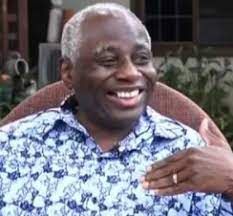
Tsatsu Tsikata speaks on John Mahama’s choice of female running mate
Lawyer luminary Tsatsu Tsikata says it was a very significant decision on the part of John Mahama to have selected Prof Jane Naana Opoku-Agyemang as running mate towards the December polls.
According to him, “I have no doubt in my mind that former President Mahama recognised the powerful impact that the choice of running mate would make for the country. In that respect he was way ahead of many people in the NDC.”
He made this comment in a zoom conference organised by the Centre for Social Justice under the theme; “The Rawlings – Mills Axis of the NDC and President Mahama’s Choice of Running Mate.”
He said, “It is clear to me that the NDC is well served by amplifying this voice of the running mate by ensuring that amidst all the din of partisanship, amidst all the chatter of irrelevance, her message for the nation is heard.”
He added that Professor Agyeman’s selection as running mate could write a better chapter in the history of Ghana, and advised women to take opportunity of the situation and position themselves in places of leadership.
“Let us consider particularly how women can seize this moment and take up their rightful positions in the leadership of this country. You do not need me to tell you what this decision can mean for women and the nation at large.” He said.
Credit: www.myjoyonline.com
According to him, “I have no doubt in my mind that former President Mahama recognised the powerful impact that the choice of running mate would make for the country. In that respect he was way ahead of many people in the NDC.”
He made this comment in a zoom conference organised by the Centre for Social Justice under the theme; “The Rawlings – Mills Axis of the NDC and President Mahama’s Choice of Running Mate.”
He said, “It is clear to me that the NDC is well served by amplifying this voice of the running mate by ensuring that amidst all the din of partisanship, amidst all the chatter of irrelevance, her message for the nation is heard.”
He added that Professor Agyeman’s selection as running mate could write a better chapter in the history of Ghana, and advised women to take opportunity of the situation and position themselves in places of leadership.
“Let us consider particularly how women can seize this moment and take up their rightful positions in the leadership of this country. You do not need me to tell you what this decision can mean for women and the nation at large.” He said.
Credit: www.myjoyonline.com

Centre for Social Justice appoints Council and Fellows
The Centre for Social Justice (CSJ) on Monday announced the appointment of a number of individuals to its Council, as well as the selection of experts to serve as Fellows of the Centre.
The Council is chaired by Dr Sodzi Sodzi-Tettey (Medical Doctor and Founder of the CSJ).
Other members are Dr Amanda Cofie (Academic), Bashiratu Kamal-Muslim (Gender expert), Theodore Albright (Legal practitioner), Philip Delali Zumanu (Business consultant), Stephen Kemetse (Fintech executive) and George Ferguson Laing (Communications expert).
Fellows who have been appointed by the CSJ include the following; Dr. William Nii Ayitey Menson (Health and Equity), Nii Armah Addy (Education and Social Transformation), Mrs. Bashiratu Kamal Muslim (Gender and Social Inclusion) and Dr. Theresa Mannah-Blankson (Finance and Economy).
According to Dr. Sodzi-Tettey, “the work of the CSJ revolves around five key thematic pillars, Health and Equity, Education and Social Transformation, Gender and Social Inclusion, Finance and Economy, and Governance, Legal and Constitutional Affairs.”
He said that the Fellows have been appointed to oversee each pillar and lead a team of experts to undertake research, lead policy dialogue and carry out advocacy that would ensure greater participation of the citizenry.
Particular focus will be on poor and vulnerable groups in all spheres of national endeavour.
The CSJ is a Think Tank and a platform for Academics, Activists and Ghanaian patriots aiming for greater social inclusion in the distribution of the wealth, privileges and opportunities for the society.
Credit: www.myjoyonline.com
The Council is chaired by Dr Sodzi Sodzi-Tettey (Medical Doctor and Founder of the CSJ).
Other members are Dr Amanda Cofie (Academic), Bashiratu Kamal-Muslim (Gender expert), Theodore Albright (Legal practitioner), Philip Delali Zumanu (Business consultant), Stephen Kemetse (Fintech executive) and George Ferguson Laing (Communications expert).
Fellows who have been appointed by the CSJ include the following; Dr. William Nii Ayitey Menson (Health and Equity), Nii Armah Addy (Education and Social Transformation), Mrs. Bashiratu Kamal Muslim (Gender and Social Inclusion) and Dr. Theresa Mannah-Blankson (Finance and Economy).
According to Dr. Sodzi-Tettey, “the work of the CSJ revolves around five key thematic pillars, Health and Equity, Education and Social Transformation, Gender and Social Inclusion, Finance and Economy, and Governance, Legal and Constitutional Affairs.”
He said that the Fellows have been appointed to oversee each pillar and lead a team of experts to undertake research, lead policy dialogue and carry out advocacy that would ensure greater participation of the citizenry.
Particular focus will be on poor and vulnerable groups in all spheres of national endeavour.
The CSJ is a Think Tank and a platform for Academics, Activists and Ghanaian patriots aiming for greater social inclusion in the distribution of the wealth, privileges and opportunities for the society.
Credit: www.myjoyonline.com
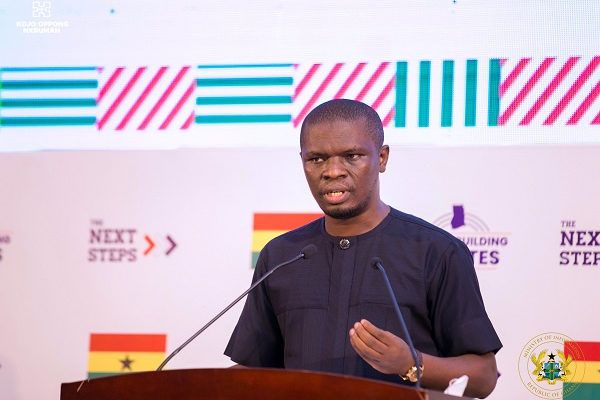
Reconstitute Sports Ministry’s Advisory Board immediately – Centre for Social Justice
The Centre for Social Justice (CSJ) has expressed serious disappointment over the composition of the recently inaugurated Ministry of Youth and Sports’ Ministerial Advisory Board.
The CSJ contended that there is no female, Person With Disability (PWD) or youth on the Ministerial Advisory Board.
“We at the Centre for Social Justice hereby express serious disappointment for the blatant disregard for a gendered and youth representation on this board,” it said in a press statement to register its displeasure.
According to CSJ, the exclusion of women, youths, and other vulnerable groups from the Advisory Board is appalling and untenable, “incredibly implying an absence of well-qualified woman, youth and PWD in the public and private sectors with the requisite expertise.”
“In our opinion, the appointment of an all-male team is in very poor taste, as it hardly reflects the best practice of drawing deeply from a rich and diverse pool of skills and resources available in the country currently.
The CSJ contended that there is no female, Person With Disability (PWD) or youth on the Ministerial Advisory Board.
“We at the Centre for Social Justice hereby express serious disappointment for the blatant disregard for a gendered and youth representation on this board,” it said in a press statement to register its displeasure.
According to CSJ, the exclusion of women, youths, and other vulnerable groups from the Advisory Board is appalling and untenable, “incredibly implying an absence of well-qualified woman, youth and PWD in the public and private sectors with the requisite expertise.”
“In our opinion, the appointment of an all-male team is in very poor taste, as it hardly reflects the best practice of drawing deeply from a rich and diverse pool of skills and resources available in the country currently.

Centre for Social Justice condemns Ejura killing
Centre for Social Justice (CSJ) has bemoaned the recent spate of insecurity recorded in the country.
In a press statement signed by the Council of Chair, Sodzi Sodzi-Tettey on Monday, the group condemned the killing of Ibrahim ‘Kaaka’ Mohammed, and the associated deaths and injuries recorded in Ejura in the Ashanti Region on June 29.
Mr. Sodzi-Tettey noted that his outfit was smacked with shock by “the death of two mourners with four others injured through gunshots fired from security forces while mourning and decrying the death of their colleague, family, and friend, Ibrahim ‘Kaaka’ Mohammed in the Ejura District of the Ashanti Region.”
According to him, a report alleged that prior to Kaaka’s demise, he received threatening voice messages with partisan political undertones.
Therefore, the need for the incumbent government and security agencies to swiftly provide justice by investigating and punishing perpetrators.
Credit: www.myjoyonline.com
In a press statement signed by the Council of Chair, Sodzi Sodzi-Tettey on Monday, the group condemned the killing of Ibrahim ‘Kaaka’ Mohammed, and the associated deaths and injuries recorded in Ejura in the Ashanti Region on June 29.
Mr. Sodzi-Tettey noted that his outfit was smacked with shock by “the death of two mourners with four others injured through gunshots fired from security forces while mourning and decrying the death of their colleague, family, and friend, Ibrahim ‘Kaaka’ Mohammed in the Ejura District of the Ashanti Region.”
According to him, a report alleged that prior to Kaaka’s demise, he received threatening voice messages with partisan political undertones.
Therefore, the need for the incumbent government and security agencies to swiftly provide justice by investigating and punishing perpetrators.
Credit: www.myjoyonline.com
